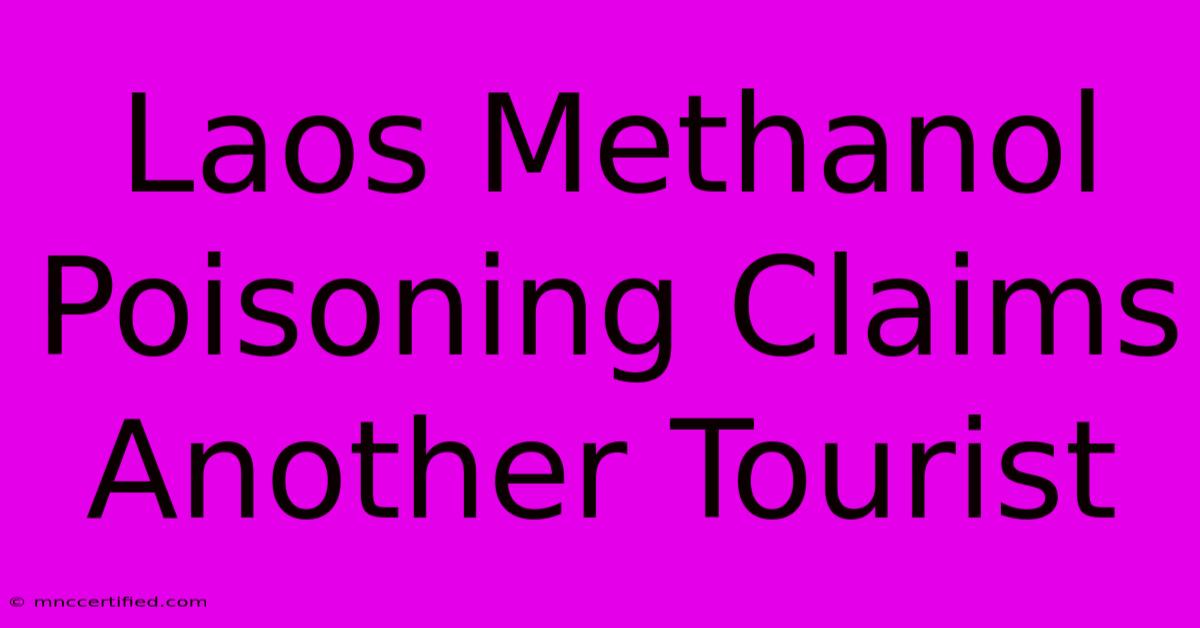Laos Methanol Poisoning Claims Another Tourist

Table of Contents
Laos Methanol Poisoning Claims Another Tourist: A Tragic Reminder of Travel Safety
The recent death of a tourist in Laos due to methanol poisoning serves as a stark reminder of the dangers lurking beneath the surface of seemingly idyllic travel destinations. This heartbreaking incident highlights the critical need for increased awareness and stricter regulations regarding alcohol consumption, particularly in less developed countries. While Laos boasts stunning landscapes and rich culture, travelers must be vigilant about potential health risks, including the consumption of contaminated alcohol.
Understanding the Dangers of Methanol Poisoning
Methanol, also known as methyl alcohol or wood alcohol, is a highly toxic substance. Unlike ethanol (the alcohol found in alcoholic beverages), methanol is not metabolized by the body safely. Instead, it's converted into formaldehyde and formic acid, which are extremely damaging to the body's organs, particularly the eyes, liver, and nervous system. Even small amounts of methanol can cause severe health issues, and larger quantities can be fatal.
Symptoms of Methanol Poisoning
Symptoms of methanol poisoning can appear anywhere from a few hours to several days after ingestion and can vary in severity. They can include:
- Nausea and vomiting: These are often early indicators.
- Headache and dizziness: These symptoms can be easily mistaken for other ailments.
- Blurred vision or blindness: This is a serious and potentially irreversible consequence.
- Abdominal pain: Severe pain can indicate significant organ damage.
- Difficulty breathing: This suggests severe respiratory compromise.
- Loss of consciousness: This is a life-threatening symptom requiring immediate medical attention.
If you suspect methanol poisoning, seek immediate medical attention. Time is critical in treating this potentially fatal condition.
Why is Methanol Poisoning a Problem in Laos?
The prevalence of methanol poisoning in Laos, and other developing countries, stems from several factors:
- Lack of regulation: Weak enforcement of alcohol production and distribution standards allows for the unregulated sale of contaminated alcohol.
- Counterfeit alcohol: The presence of counterfeit or illegally produced alcohol makes it difficult for consumers to distinguish safe from dangerous products.
- Limited consumer awareness: Many travelers may be unaware of the risks associated with consuming locally produced alcohol.
- Inadequate infrastructure: Limited access to advanced medical facilities can hinder the effective treatment of poisoning cases.
How to Protect Yourself from Methanol Poisoning While Traveling in Laos (and Elsewhere)
Staying safe while traveling requires proactive measures. Here's how to minimize your risk of methanol poisoning:
1. Stick to Reputable Establishments:
Choose well-known hotels, restaurants, and bars. These establishments are more likely to source their alcohol from reputable suppliers.
2. Opt for Branded Alcohol:
When possible, choose internationally recognized brands of alcohol. While not foolproof, this significantly reduces the risk of consuming counterfeit products.
3. Avoid Locally Produced Spirits:
Unless you are absolutely certain of its source and purity, it’s best to avoid locally produced spirits, particularly those sold in informal settings.
4. Observe the Alcohol:
Look for any signs of unusual cloudiness, sediment, or off-putting smells. These could indicate contamination.
5. Be Aware of Your Surroundings:
Exercise caution when purchasing and consuming alcohol, especially in less-regulated environments.
6. Travel Insurance:
Ensure your travel insurance covers medical emergencies, including hospitalization and evacuation, should you require them.
The Importance of Government Action and Tourist Awareness
Combating methanol poisoning requires a multi-pronged approach. Governments in countries like Laos need to strengthen regulations on alcohol production and distribution, while simultaneously investing in public health initiatives to educate both locals and tourists about the dangers of methanol. Travelers, in turn, must remain vigilant and take precautions to protect themselves. The tragic death of this tourist serves as a potent reminder that responsible travel requires awareness and precaution, especially when consuming alcohol in unfamiliar environments. Be informed, be cautious, and stay safe.

Thank you for visiting our website wich cover about Laos Methanol Poisoning Claims Another Tourist. We hope the information provided has been useful to you. Feel free to contact us if you have any questions or need further assistance. See you next time and dont miss to bookmark.
Featured Posts
-
Certificate Of Insurance Example
Nov 21, 2024
-
Powerful Bomb Cyclone Hits Wa
Nov 21, 2024
-
High Street Closed Amersham Funeral
Nov 21, 2024
-
Axa Travel Insurance Philippines
Nov 21, 2024
-
24 75 An Hour Is How Much A Year
Nov 21, 2024